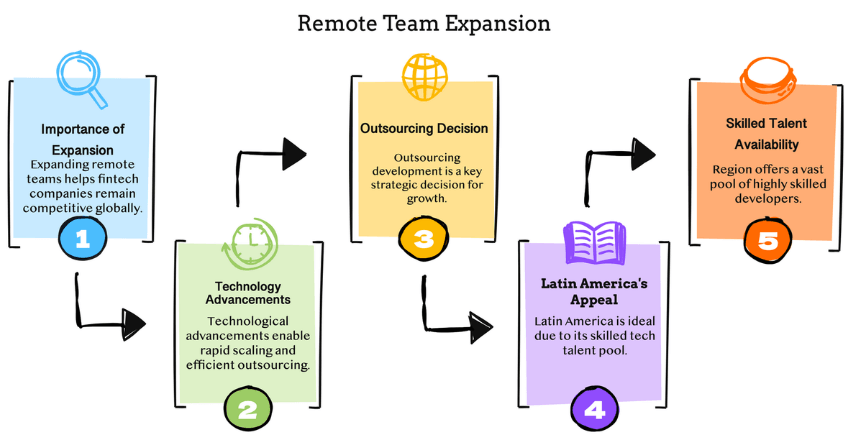
Why Latin America is the best choice for scaling remote development teams in fintech
Expanding remote development teams into new regions is a pivotal move for fintech companies aiming to stay competitive. With technological advancements allowing companies to scale faster than ever before, outsourcing development is increasingly becoming the strategic decision. When considering regions for building remote teams, Latin America emerges as a premier choice. Its combination of skilled talent, cultural alignment with North America, time zone compatibility, and cost-effective solutions positions it as a leading destination for fintech growth.
Thank you for reading this post, don't forget to subscribe!The Talent Pool: Highly Skilled Professionals at Competitive Rates

Latin America boasts a rapidly growing pool of highly educated, skilled software developers. As the demand for fintech solutions rises globally, so does the emphasis on quality development teams. Many countries in this region are investing heavily in STEM (science, technology, engineering, and mathematics) education, which means fintech companies can tap into an expanding pool of talent ready to take on complex projects.
Countries like Brazil, Argentina, and Mexico produce top-tier graduates in engineering and computer science, often with specializations in fintech, data science, and blockchain technologies. This makes them prime candidates for building high-performing remote teams.
Unlike other regions where quality can vary significantly, Latin America offers a balance of expertise and cost efficiency. Developer salaries in Latin America are typically lower than in North America or Europe, which makes scaling teams more affordable. Despite lower rates, the skill levels remain comparable, ensuring that businesses do not have to sacrifice quality for cost savings.
Cultural Compatibility: A Shared Business Mindset
When building remote development teams, cultural alignment is as important as technical prowess. Latin America offers a business culture that aligns closely with the North American mindset, especially when compared to regions in Asia or Eastern Europe. In both regions, expectations of professionalism, communication standards, and work ethic are similar, which reduces the challenges often encountered when working with teams in distant cultures.
Being able to communicate effectively with your team is crucial. In Latin America, the alignment with Western business practices and the shared focus on results makes collaboration smoother. This cultural synergy extends beyond business practices to working hours. Remote teams based in Latin America are generally available during North American work hours, which ensures real-time communication and quicker feedback loops. These overlapping hours make it easier to manage projects, conduct meetings, and resolve issues without significant delays.
The benefits of this are particularly evident in the fintech industry, where rapid deployment of features and quick issue resolution are essential. The ability to work side-by-side with remote teams in real-time accelerates development cycles, making it easier to bring innovative financial products to market faster.
Moreover, it’s not just about proximity; this time zone overlap fosters better integration into agile workflows. In fintech, where product iterations and customer feedback play critical roles, continuous collaboration between development teams and business stakeholders is essential. Latin American teams’ availability during the same workday as North American companies enhances the ability to innovate and iterate quickly.
Cost-Effectiveness: Maximizing Value for Money

Cost remains a significant factor for any company seeking to scale development teams. Latin America offers fintech businesses access to top-notch developers at rates considerably lower than their counterparts in North America and Western Europe. For example, while a senior software engineer in the U.S. can cost upwards of $150,000 annually, their Latin American counterpart might cost between $40,000 and $70,000, depending on the location and level of expertise.
This cost efficiency doesn’t mean a compromise in quality. Latin American developers often bring years of experience and expertise to the table. Many fintech startups in the U.S. and Europe have successfully scaled their operations with the help of teams in Brazil, Colombia, and Argentina, all while maintaining high standards of performance and innovation.
For fintech companies looking to scale without draining resources, Latin America offers a cost-effective solution. The cost of building a development team here is extremely competitive, especially when compared to other outsourcing destinations.
Favorable Business Environment and Growing Ecosystem
Latin America’s growing reputation as a hub for technology and innovation cannot be overlooked. Countries like Mexico, Brazil, and Argentina are increasingly attracting venture capital for tech startups, particularly in fintech. Government policies in many countries are also becoming more favorable to startups, offering tax incentives, grants, and regulatory support that help attract foreign investment.
In the fintech space, this growing ecosystem makes Latin America an even more attractive location. With an expanding number of accelerators, incubators, and venture capital opportunities, fintech companies can scale with the added benefit of tapping into a thriving, supportive business community.
Building Trust: The Importance of Local Presence
 One concern for companies scaling remotely into a new region is building trust. In Latin America, however, many fintech firms successfully navigate this challenge by establishing a local presence, even if minimal. Opening a small office or partnering with local businesses can help establish credibility and strengthen relationships with local teams and stakeholders.
One concern for companies scaling remotely into a new region is building trust. In Latin America, however, many fintech firms successfully navigate this challenge by establishing a local presence, even if minimal. Opening a small office or partnering with local businesses can help establish credibility and strengthen relationships with local teams and stakeholders.
Trust is fundamental in any business, particularly in fintech, where handling sensitive financial data is involved. By establishing a local presence or collaborating with trusted local partners, fintech companies can gain credibility.
Many companies also establish relationships with universities, non-profits, and local entrepreneurs, which facilitates smoother entry into the market and allows them to tap into established networks.
Leveraging Networks and Industry Connections
For fintech firms, establishing connections within the financial sector is crucial for rapid growth. Latin America offers various industry connections, from established fintech associations to financial regulatory bodies. By aligning with these networks, companies can ensure they stay updated with the latest developments in regulation, technology, and market trends, which is crucial in the fast-moving fintech space.
Additionally, networking with other tech companies, venture capitalists, and fintech innovators provides opportunities for collaboration, partnerships, and knowledge exchange. This level of networking is particularly beneficial for companies looking to scale efficiently and stay ahead of the competition.
Regulatory Considerations: Navigating the Financial Landscape
As fintech companies grow, understanding local regulatory environments becomes a priority. Latin American countries have a diverse regulatory landscape, which can present both challenges and opportunities. However, many of these nations are becoming more fintech-friendly by updating regulations to accommodate digital banking, cryptocurrency, and other emerging technologies.
Understanding the specifics of each country’s regulations is essential. Some countries, like Mexico and Brazil, have established progressive fintech laws, which can provide a clear framework for companies entering the market. Working with local legal experts can help navigate these regulations and ensure compliance, ultimately allowing companies to scale without facing legal hurdles.
Why Latin America?
Scaling remote development teams for fintech growth is a strategic decision that requires careful consideration of talent, cost, and operational efficiency. Latin America stands out as the top destination, offering a highly skilled workforce, cultural compatibility with North America, favorable time zones, and cost-effectiveness—all while tapping into a growing business ecosystem.
For fintech companies, the decision to expand into Latin America is one that positions them for long-term success. By leveraging the region’s unique advantages and understanding local dynamics, businesses can scale their remote development teams efficiently and with confidence.


